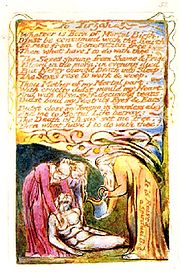
To Tirzah
Encyclopedia

William Blake
William Blake was an English poet, painter, and printmaker. Largely unrecognised during his lifetime, Blake is now considered a seminal figure in the history of both the poetry and visual arts of the Romantic Age...
that was published in his collection Songs of Experience. It is often described as the most difficult of the poems because it refers to an oblique character called "Tirzah
Tirzah
Tirzah is a Hebrew word meaning "she is my delight." In the Bible it is the name of a woman, one of the daughters of Zelophehad.-Hebrew name:...
", whose identity remains obscure. Tirzah is apparently to be rejected as a demonic figure. According to Northrop Frye
Northrop Frye
Herman Northrop Frye, was a Canadian literary critic and literary theorist, considered one of the most influential of the 20th century....
, Blake identified the name Tirzah with worldliness, because the name appears in the Bible to refer to both a rebellious town and to one of the Daughters of Zelophehad. The latter story was about female inheritance rights which were linked to restrictions on marriage and the maintenance of tribal boundaries. Blake therefore took the name Tirzah to be a symbolic reference to worldly materialism, as opposed to the spiritual realm of Jerusalem.
Blake's illustration to the poem depicts two women holding a naked prostrate male figure who appears to be unconscious or dead. An elderly man prepares to pour liquid from a jug over the figure. On the elderly man's clothing the words "it is raised a spiritual body" are written.
Text
Whate'er is born of mortal birthMust be consumed with the earth,
To rise from generation free:
Then what have I to do with thee?
The sexes sprung from shame and pride,
Blowed in the morn, in evening died;
But mercy changed death into sleep;
The sexes rose to work and weep.
Thou, mother of my mortal part,
With cruelty didst mould my heart,
And with false self-deceiving tears
Didst blind my nostrils, eyes, and ears,
Didst close my tongue in senseless clay,
And me to mortal life betray.
The death of Jesus set me free:
Then what have I to do with thee?

